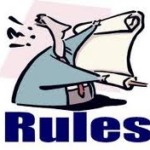All Safety Rules Aren’t Created Equal

Most workplaces have many, many safety rules. But some of those rules are more important than others, especially those that, if broken, are likely to lead to serious injuries or death. Examples include rules on use of fall protection and lockout rules.
Some workplaces label such key safety rules as “cardinal” or “red” rules. And employers often have zero tolerance for violations of cardinal rules, spelling out strict, automatic penalties to be imposed on violators.
In a recent poll, we asked if you have any cardinal rules in your workplace:
- 58% said yes
- 42% said no.
Cardinal rules may seem like a great idea but they can raise disciplinary issues. That’s because employers are generally expected to use progressive discipline in which workers are punished for violations, such as safety infractions, on a sliding scale, with first or second violations punished less harshly than fourth or fifth. The circumstances of the violation can lead to jumping steps in the usual progression.
But cardinal rules typically have mandatory minimum penalties that automatically apply to all violators—whether they have an otherwise clean record or are habitual offenders. Thus, they’re inconsistent with progressive discipline.
However, courts and labour boards will permit employers to use cardinal rules provided that they:
- Properly identify rules that warrant classification as cardinal rules
- Make it very clear to workers the expectations as to these specific rules and the punishment they can expect for violations
- Adequately train workers on compliance with these rules
- Consistently apply them to all violators.
Do you think cardinal rules are appropriate’ What are some cardinal rules in your workplace’